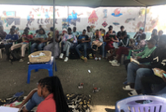Msemo huu hutumika ili kueleza jinsi mapendeleo ya watu hutofautiana, ama kuonyesha matumaini kwamba wanadamu ni wabunifu katika masuala ya kupanga upya au kuchakata vitu vilivyotupwa na wengine.
Kwa mfano, mjasiriamali Gibson Kiwago, mwanzilishi wa WAGA Tanzania, anachakata betri za laptop ili kuleta umeme kwa nyumba na maduka. Jifunze zaidi kuhusu E-Waste (Orodha ya Kusoma)!
Dhana kwamba thamani ya kitu hutegemea mtazamo wako ipo tangu zamani. Chimbuko cha msemo huu ni methali ya Kiingereza iliyotumika karne ya 17:
One man's meat is another man's poison
Nyama na mtu mmoja ni sumu ya mtu mwengine
Je umewahi kuona thamani katika kitu kilichotupwa na mwengine?


























